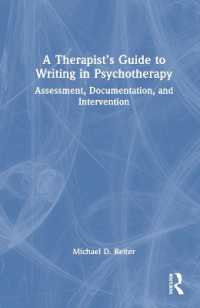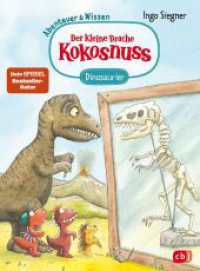- ホーム
- > 洋書
- > 英文書
- > Religion / Ethics
Full Description
An eye-opening look at the crossroads of religion and science, illuminating the unexpected common ground shared by biology and Buddhism.
Many high-profile public intellectuals-such as the well-known "New Atheists" Richard Dawkins, Daniel Dennett, and the late Christopher Hitchens-have argued that religion and science are highly antagonistic, two views of the world that are utterly incompatible. David Barish, a renowned biologist with thirty years of experience, largely agrees with them-with one very big exception. And that exception is Buddhism.
In this fascinating book, David Barash highlights an intriguing patch of common ground between scientific and religious thought, illuminating the many parallels between biology and Buddhism, allowing readers to see both in a new way. Indeed, he shows that there are numerous places where the Buddhist and biological perspectives coincide. For instance, the cornerstone ecological concept—the interconnectedness and interdependence of all things—is remarkably similar to the fundamental insight of
Buddhism. Indeed, a major Buddhist text, the Avatamsaka Sutra-which consists of ten insights into the "interpenetration" between beings and their environment-could well have been written by a trained ecologist. Barash underscores other similarities, including a shared distrust of simple
cause-and-effect analysis, a recognition of life as transient and as a "process" rather than permanent and static, and an appreciation of the "rightness" of nature along with a recognition of the suffering that results when natural processes are tampered with. After decades of removing predators to protect deer and elk herds, ecologists have belatedly come to a Buddhist realization that predation—and even forest fires—are natural processes that have an important place in maintaining healthy
ecosystems.
Buddhist Biology sheds new light on biology, Buddhism, and the remarkable ways the two perspectives come together, like powerful searchlights that offer complementary and valuable perspectives on the world and our place in it.
Contents
Table of Contents ; Chapter 1: A Science Sutra ; Chapter 2: Non-Self (Anatman) ; Chapter 3: Impermanence (Anitya) ; Chapter 4: Connectedness (Pratitya-Samutpada) ; Chapter 5: Engagement, Part 1 (Dukkha) ; Chapter 6: Engagement, Part 2 (Karma) ; Chapter 7: Meaning (Existential Biobuddhism?) ; Appendix







